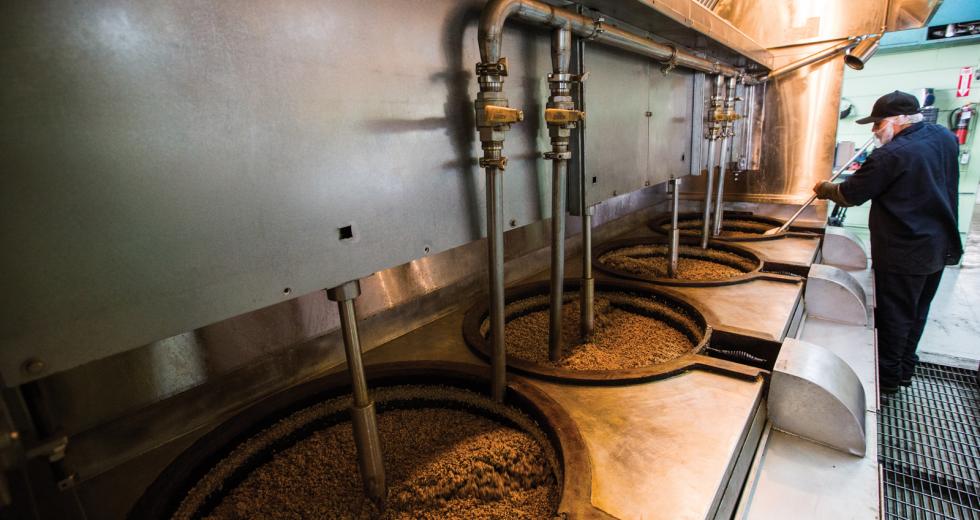Pulling up to the bland business park that is home to La Tourangelle’s nut oil bottling facility gives no indication of the nexus of culinary artistry housed inside.
But step through the doors and start talking to Matthieu Kohlmeyer, the energetic founder and CEO of the Woodland company, and you’ll discover that this quiet farming town is home to a vibrant French connection and a business that’s ridden the wave of consumer health trends and successfully plugged into the farm-to-fork movement.
“We came to California in 2002 and said, `OK, we’re going to take the 150-year-old French methods from our family oil mill in the Loire Valley and make delicious nut oils using local California nuts,’” Kohlmeyer says. “And then we started being on the shelf, starting from zero really. And now we’re sold in 10,000 stores around the country, and we’ve got a pretty nice success story.
The story of La Tourangelle begins in Saumur, a town on the Loire River in France where Kohlmeyer’s family runs the Huilerie Croix Verte SAS nut oil company. In 2002, it entered into a 50-50 partnership with California Oils Corp., based in Richmond, to create La Tourangelle. Woodland ended up as the site partly because Cal Oils had a building available there; serendipitously, it’s also in the heart of walnut country, a staple of La Tourangelle’s business.
At the time, nut oils could be found in U.S. supermarkets, but “the quality was really terrible,” Kohlmeyer says. “We thought, ‘OK, we know how to make it really well, and the product that is being sold in California and the United States is usually very expensive and really not that good. So, that gives us an opportunity.’ But then it was a real challenge though because no one knew about walnut oil and specialty oils.”
Fortunately for La Tourangelle, the company launched stateside at a time when American consumers were beginning to demand the skinny on fat, looking for the healthiest — and tastiest — choices. Interest in olive oil zoomed, and following that came more interest in nut oils.
Specific sales data are hard to come by because the nut oil industry is so small, but officials at the Specialty Food Association are seeing rising interest in nut oils and olive oil alternatives, driven by health concerns and a hunt for new tastes. For instance, one of the top five food trends identified at the association’s Winter Fancy Food Show in San Francisco earlier this year was “oil nouveau,” non-olive oils like coconut and cherry seed.
La Tourangelle produced its first batch of walnut oil in June of 2003 and carried it to the Fancy Food Show in New York in July. “Right away, the response was amazing,” Kohlmeyer says. “People loved our packaging, and gourmet shops such as Williams-Sonoma and Sur La Table wanted our products.” They received orders from retailers like Whole Foods, and the big breakthrough came in 2005 when the company landed national distribution in Safeway and Kroger stores.
Health-food consumers and gourmands began spooning La Tourangelle oils into recipes ranging from pesto to pancakes, replacing “less desirable” vegetable oils. Walnut oil contains omega-3 fatty acids and antioxidants that may be beneficial to health, according to Sheri Zidenberg-Cherr, a nutritionist with the UC Davis Cooperative Extension. Almond oils, on the other hand, aren’t high in omega-3 fatty acids but do contain good amounts of monounsaturated fatty acids as well as other polyphenol compounds (antioxidants).
Still, Kohlmeyer is cautious about touting nut oil as the cure for what ails you, pointing out that food science changes rapidly and that the findings can be confusing. What he is sure about is taste. “Our main goal at La Tourangelle is to get the flavor,” he says. “It’s more than just fat. It’s really something that’s going to add a new dimension to your dish. Walnut oil will actually taste like toasted walnuts, so it makes for an amazing vinaigrette.’’
Meanwhile, demand for local, healthy, flavorful food is driving Sacramento’s blossoming farm-to-fork branding strategy, and La Tourangelle isn’t missing the opportunity to capitalize on the city’s marketing efforts.
“We’ve really seen an incredible growth in sophistication, and a lot of chefs are starting to come into this market because everything is sourced locally and because it’s creating fresher fare for what they’re cooking,” says Mike Testa, senior vice president of convention sales and business development for the Sacramento Convention & Visitors Bureau.
The bureau earlier this fall spearheaded an inaugural Farm-to-Fork Festival that featured scores of regional producers, including La Tourangelle. That kind of spotlight offered yet another opportunity for the oil to increase local brand awareness.
At the same time, local chefs are making use of La Tourangelle products in their kitchens. Sacramento chef Patrick Mulvaney, owner of the popular Mulvaney’s B&L restaurant, is one of them. He frequently uses nut oils to add layers of flavor to the dishes he creates, rubbing almond oil on meat barbecued over almond wood, for example.
“We do much of our own charcuterie. We make our own bacon. We make our own pasta,” Mulvaney says. “We’re always fiddling around with the food, but really I guess what we’re proudest of is the relationships we have built with farmers. Because of them, we are able every day to share the best this region has to offer.”
Nut oil doesn’t have a very high smoke point, so it’s not good for deep frying, unlike grapeseed oil, which La Tourangelle also bottles. But it’s excellent for adding flavor to dressings and sauces and can also be used to sauté vegetables — think halved Brussels sprouts gently braised in walnut oil.
La Tourangelle uses nuts sourced from all over the Central Valley, and mill managers taste samples to develop the right blend for consistent, flavorful oils. Once in the mill, nuts are toasted in cast-iron pans to enrich their taste then pressed and filtered to produce oil ready for bottling in the company’s traditional metal canisters.
That process isn’t easy. Nuts can be tricky to work with, especially the high-fat, irregularly shaped walnuts. And because it’s such a small industry, the expensive, hydraulic presses have to be more or less custom-made. (Kohlmeyer’s brother, who runs the French side of the operation, is an engineer, so that helps.)
Walnut and almond oils make up the bulk of La Tourangelle’s business, with all of those nuts coming from California. In all, the company bottles about 20 different oils, including sesame, coconut and pistachio oil, using nuts grown in California and elsewhere. Some of their oils are imported.
Currently, La Tourangelle is producing about 60,000 pounds of walnut oil a month, along with all their other oils, a small amount compared to the big vegetable oil companies. But, for Kohlmeyer, the volume is just about right. “People are still discovering nut oils,” he says. “So it’s a niche business. But for a small business like us, it’s perfect.”
About 35 people are employed at the company’s bottling facility and mill in Woodland, and there are plans to build a new and larger mill that may eventually be open to visitors, further developing the farm-to-fork theme.
“Our main goal is to educate consumers on the benefits of nut oils,” Kohlmeyer says. “It is amazing how a simple ingredient can turn a simple dish into something special. We call it the ‘wow’ effect.”
Michelle Locke is a Bay Area-based freelance writer. Follow her @Locke_Michelle.
Recommended For You

Industrial Reinvention
Woodland finds new uses for old buildings
When West Sacramento-based Clark Pacific went shopping for a third location to expand its precast concrete business, it found a home with a familiar name: the former Spreckels Sugar Mill, just outside Woodland.

Up & Down Main Street
Small town realities and the long road to prosperity
Say what you will about the severity of state and federal budget woes, but it’s arguably the small towns that are bearing the real brunt of today’s economy.



